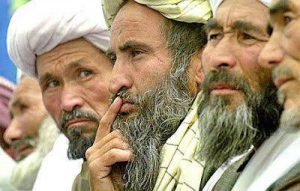Pashtuns, Global Conspiracy Hunt

Oliver Roy, a French journalist and writer states his memories from southwest areas, specially Kandahar after attending field presence and several trips to Afghanistan during Jihad, this way; “If you want to know Afghanistan, first you should know Pashtuns, because the Afghan social structure and political institutions have been formed based on the culture of these people.” Ahmad Shah Abdali, first gathered tribal leaders in Shir-0-Khurshid area of Kandahar when came to power, established his political legitimacy by them and then, put his political system at the service of them; so Afghanistan has tied with the name of Pashtuns since Ahmad Shah Abdali to Hamid Karzai and national unity government headed by Mohammad Ashraf Ghani. Sustainability of such rule, according to the words of Karl Popper, author of the book “open society and its enemies” has created a kind of moral superiority and guardianship for Pashtuns than to other inhabitants of the land, which unfortunately, political actors have always used this process as a goodwill and traditional credit in order to eliminate rivals. As we occasionally witness that a number of these actors shout out that Tajiks should go to Tajikistan, Uzbeks to go to Uzbekistan, here Afghanistan is the “land of Pashtuns.”
Precursors of this divisive voice without paying attention to the nature of their claim that if other folks get out from a geographical area, so how can they claim a national country, national interests, and national identity! If other people are deprived of citizenship rights and national rights, how owners of that country introduce themselves, national servants? In a country where national identity does not form, national interests are not realized, and if in a society where national interests are not honored, all crimes, treason, such as corruption, violence lose its ugly face and will change into a plain action. If the governance sequence would pace an institutionalized process since Ahmad Shah Abdali to Hamid Karzai, based on political rationality and social justice, today, being an Afghan would be considered a national pride, had an international prestige. Challenges like Daneshgah and Puhantun words (two words that refer to university) were not the major political discourse of our academic society centers. Rulers of this process have never thought about institutionalizing governing based on rationality and justice, therefore each has come, ruled, looted and has gone. An ethnic has become responsible for their performance that it has been ruled in the name of them. I have a great memory in this regard: “when I was serving as a diplomat in Iran, I had a meeting with a political official, who was a spiritual character. He said that you should know the prestige of your people, specially young Pashtun people. we are spending money for 30 years and still, our society climate is not turned Islamic, but in Afghanistan when you hear Azan (call to prayer) sound and song of Ramazan, the whole society, specially young people mobilize towards spirituality and Islam.”
David Stone, the father of functionalism in politics believes that post-crisis countries can have a desirable and viable political system when legitimate actors and elements such as religious leaders, political parties, tribal influential and elites spend their legitimacy for a centered political establishment.
However, if the intellectuals and political elites of the community, in general, and Pashtun elites, in particular, do not be determined in creating a plausible political system based on social justice; the result is the current fate of Afghan people which our community is faced with it since Ahmad Shah Abdali and the consequences focus on the ethnics that the politics and government are formed in the name of them, but they themselves neither have a ceiling in the deserts nor a cave in the mountains. Unfortunately, other nationals have seen them as a political culprit and this is how the geography of Afghanistan will always be used as the test scene of ethnic conflicts, political competitions and proxy wars.
Dr. Danesh Bakhtiyari – (DID) press agency
Translated by: Taher Mojab